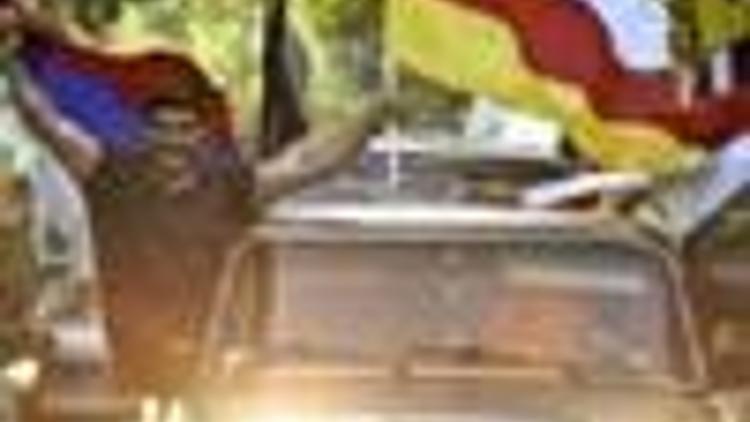Russia reaches out to China as West fumes over Georgia's separatists
Güncelleme Tarihi:

Russian President Dmitry Medvedev is scheduled to meet his Chinese counterpart Hu Jintao on Wednesday, as Moscow looked to bolster support in a diplomatic stand-off with the West over its conflict with Georgia. (UPDATED)
Western governments roundly condemned
Medvedev is to fly to the Central Asian
Stepping up its criticism of Moscow, France said Russia was "outside international law", with Foreign Minister Bernard Kouchner asserting the European Union "cannot accept these violations."
Kouchner also said on Wednesday
"It’s very dangerous. There are other objectives that one can suppose are the objectives of
Some analysts speculate that Russian troops might target the southern Ukrainian region of Crimea if President Viktor Yushchenko continues to openly support
Crimea, which is populated mostly by ethnic Russians, is home to the
The Molodovan region of Transdniestr, which lies in the east of the country adjoining
In a somber television address on Tuesday, Medvedev announced he had signed decrees recognizing the independence of the two regions at the heart of the conflict that erupted this month in
Recognizing South Ossetia and Abkhazia was seen as cementing
In an unprecedented move for the Kremlin, Medvedev gave a string of interviews to Western media outlets to explain
"The most important thing is to defend the rights of the people who live in
Medvedev is to join leaders on Thursday for the summit of the Shanghai Cooperation Agreement, a regional security group dominated by
The group was set in 2001 as a counterweight to NATO’s influence in the strategic Central Asian region.
The Kremlin decision was greeted with bursts of gunfire on the streets of
WEST’S RESPONSE
But the response from the West was decidedly icy.
The European Union said it "strongly condemned" the move and a statement from the French EU presidency said the 27-nation bloc would now "examine from this point of view the consequences of
NATO nations also reaffirmed their condemnation on Wednesday and jointly called on Moscow to reverse the step.
"The North Atlantic Council condemns the decision of the Russian Federation to extend recognition to the South Ossetian and Abkhazian regions of Georgia and calls upon Russia to reverse its decision," the 26-nation military alliance said in a statement after its main political body met in Brussels.
Bush called on "
In his televised address, Georgian President Mikhail Saakashvili shot back at
"This is the first attempt in Europe after Nazi Germany and the Stalinist Soviet Union to put a neighboring state on its knees and to change the borders of
In a sign of a growing chill with the West,
At the heart of the stand-off is Kosovo, whose aspirations for independence from
In "international relations, you cannot have one rule for some, and another rule for others," Medvedev wrote in a commentary in Wednesday’s issue of the Financial Times.
The international community had warned
Tensions have mounted since Russian forces entered
The world’s second-largest oil producer,
Sergei Lavrov reiterated that

